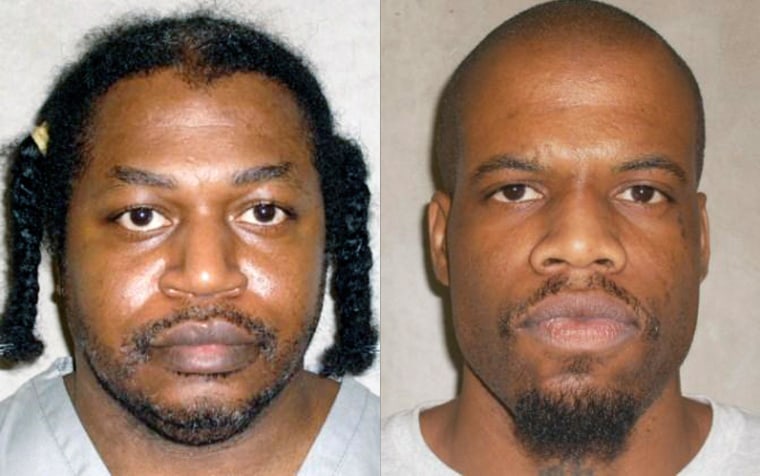An Oklahoma appeals court has postponed the executions of two convicted killers for a month after the state revealed it didn't know what drugs it planned to use for the lethal injections.
Clayton Lockett, who was slated to die Thursday, had his date moved to April 22. Charles Warner, who was supposed to be executed on March 27, was pushed to April 29.
The delay grew out of a lawsuit the two men filed demanding Oklahoma disclose where it was getting the pentobarbital and vecuronium it needed for the executions.
In a brief filed Monday, the state dropped a bombshell: It has not been able to get the two drugs and is considering a last-minute change to the protocol.
In light of that, the Oklahoma Court of Criminal Appeals tossed the current execution orders and set the new dates, but denied Lockett and Warner's request for an indefinite stay of execution.
Lockett's stepmother, Ladonna Hollins, said that despite the 11th hour legal maneuvers, when she visited him Saturday he was prepared to die.
"He wants it over with," she said. "He's tired of living in these conditions. It's torture."
Yet she also said Lockett — who was convicted of murdering a 19-year-old woman who was raped, shot and buried alive during a night of depravity in 1999 — fears he will suffer in his final moments.
"We do not want to see Clayton executed but we know that’s going to happen," Hollins said. "Why do they not have the correct drugs? This is crazy."
Lockett's attorneys could be reached for comment, but Warner's federal public defender said she was relieved by the court's ruling, which allows the two men to press their legal challenges.
"We hope that no execution will go forward until we are able to obtain full information about how Oklahoma intends to conduct those executions, including the source of its execution drugs," said the lawyer, Madeline Cohen.
Oklahoma Attorney General Scott Pruitt said he was upset by the court's decision.
"This delay is not about the facts of the case, nor does it seek to overturn the convictions of these two murderers," he said in a statement.
"Instead, it’s about outside forces employing threats, intimidation and coercion to keep the State of Oklahoma from imposing the punishment handed down for these heinous crimes.
"But rest assured, accountability for these murders will occur. It’s not a matter of if these punishments will be carried out, but it is only a matter of when."
Executions have been delayed in several states because of a nationwide shortage of execution drugs.
Manufacturers of some chemicals have refused to sell them to prisons for executions, forcing corrections officials to come up with new cocktails or turn to less-regulated compounding pharmacies.
Both routes have hit snags.
In Ohio, for instance, the first prisoner executed with the readily available drugs midazolam and hydromorphone took 25 minutes to die and was described as gasping for breath.
"It’s not a matter of if these punishments will be carried out, but it is only a matter of when."
At least two compounding pharmacies have reneged on deals to provide lethal injection drugs amid public pressure and legal challenges.
Against this backdrop, states are eager to keep the source of their chemicals secret — sparking lawsuits like the one filed by Warner and Lockett, who say the information must be made public.
Their argument: the prisoners' legal teams must be able to insure the drugs won't cause suffering that would violate the constitutional protection against cruel and unusual punishment.
A number of death-row appeals have pointed to the January Oklahoma execution of Michael Wilson, whose last words after receiving a dose of compounded pentobarbital were: "I feel my whole body burning."
State officials have generally argued that the pharmacies are entitled to anonymity because they are part of the execution team — and highlighted the barbaric crimes of the inmates who contend they should not suffer at the end.
Warner is on death row for the murder and rape of his girlfriend's 11-month-old daughter in 1997. Lockett was convicted of breaking into an acquaintance's home, repeatedly raping one woman and then killing the other, Stephanie Nieman after declaring, "Someone has got to go."
A witness testified that Lockett and the other men joked about "how tough" Nieman was when she didn't die from the gunshots. He made a videotaped confession.
His aunt, Deanna Parker, who saw him Saturday, said Lockett is remorseful and understands he has to pay the ultimate price.
"He finally has made peace with everything. He has given himself to God. He is ready to go now," she said.
She said the family had emotionally prepared for the execution only to "have the rug pulled out" because of the state's inability to carry out its own protocol.
"We feel like the boy has suffered enough," she said.
